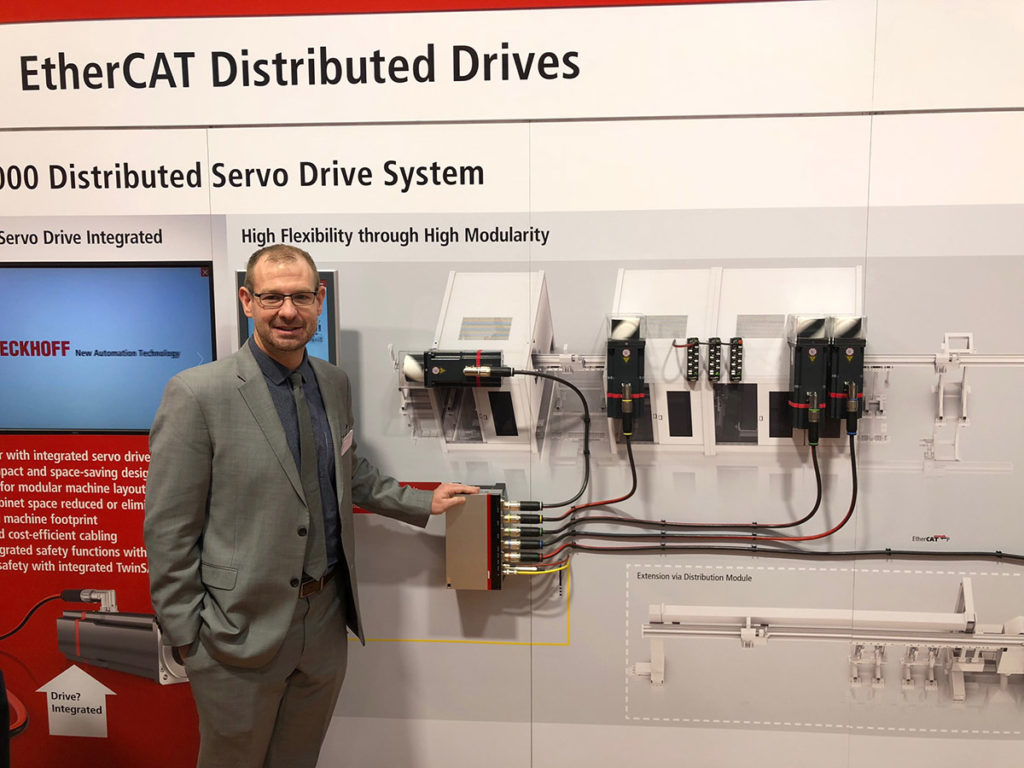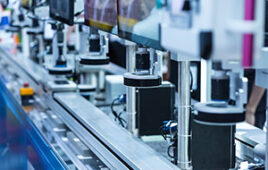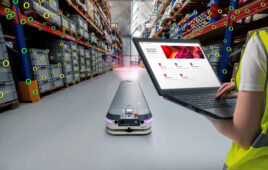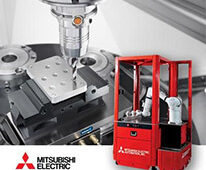
Daymon Thompson of Beckhoff stands in front of the booth’s AMP8000 distributed servo drive system display. While this system uses EtherCAT P technology for power and EtherCAT over one cable, it is not quite yet Gigabit-ready.
I spoke with Beckhoff’s Daymon Thompson at last week’s SPS IPC Drives show in Nuremberg, Germany, and the automation company has a lot going on, starting with a huge upgrade for EtherCat, the fieldbus system it created in 2003.
Beckhoff’s booth introduced attendees to EtherCAT-G 10, which is based on the 10-gigabit EtherNet standard. Some of the first functional demos showed systems running on the standard 100 megabyte EtherCAT, where you could see the frame rate and the update. There were also systems using the gigabit standard, and the rates were literally 10 times faster. Thompson said that this really opens up some new possibilities for applications.
“For example, when you need more bandwidth for general IO, drives, we rarely find any kind of limitation on EtherCAT. But, with new possibilities like cameras, to being able to bring giant images along, not only just the process data, but the full raw images, is possible,” he said. “We are introducing a few products that were in development. And it’s called this branch concept. Maybe it doesn’t need to have gigabit all the way down to every IO, every drive — and change any kind of existing product that’s on the market. We use kind of a hybrid approach where bring the EtherCAT-G down to certain branches. From there, it goes to a device that takes it back to the 100 base C and then puts it back together. Think of it as having an EtherCAT-G or G10 backbone, and then still works with existing EtherCAT products on the market. So, it’s not a new version of EtherCAT, it’s really just putting EtherCAT on a faster medium.”
Thompson said that the customer feedback at SPS has been “really interesting.”
 “It’s always interesting when we introduce a technology where we think we have an idea of a couple applications or where it’s really important. And as soon as we introduce it, we have all kinds of customers from around the world at a show like this come up with new ideas for it. Things that are in special industries or in special regions of the world, things that we’ve never thought of,” he said. “We’re going to continue to develop it a little further and then make it standardized on the EtherCAT technology group in the Summer of 2019. And then that will give access to other companies to develop it and implement it, as well.”
“It’s always interesting when we introduce a technology where we think we have an idea of a couple applications or where it’s really important. And as soon as we introduce it, we have all kinds of customers from around the world at a show like this come up with new ideas for it. Things that are in special industries or in special regions of the world, things that we’ve never thought of,” he said. “We’re going to continue to develop it a little further and then make it standardized on the EtherCAT technology group in the Summer of 2019. And then that will give access to other companies to develop it and implement it, as well.”
After 15 years of being in the market, Thompson said this shows that EtherCAT will be relevant, probably even the fastest fieldbus out there, for another 15 years.
Other tidbits from the show:
• The company is expanding how they can manage distributed control to safety systems. Modularity is key, so even if a customer is swapping out portions of a machine, or commissioning portions of the machine, the safety protocols aren’t affected. Everything is componentized and certified, so things can then be added together and certified as a whole. This will allow for the rapidly development and deploying of product.
• Beckhoff is introducing a new line of controllers, the CX7000 range. The company is taking its existing CX product family and bringing it down to smaller devices.
“The difference is between us and competitors in this very small controller market, is that we’re bringing not only just a small controller, but we’ve built in IO,” said Thompson. “There’s the ability to add EtherCAT to it — you can just add in either our EtherCAT IO terminals or talk to third parties … it opens up a whole other connectivity world in a controller costing in the range of a few hundred dollars. It also talks to the smallest range controller, the TwinCAT-3. We’re kind of excited to bring that product range down to a smaller application.”
• Out of the box thinking. Beckhoff sees the machine of the future with either smaller electrical cabinets or eliminating the electrical cabinet entirely. There’s a lot of time and manual labor involved in landing all those wires in the terminal blocks, and stripping and pulling back. Plus, there’s the real estate and size that a lot of these cabinets take up.
“We see the machine of the future being a little more plug and play and cabinet-less,” he said. “It will save a lot of cost on the hardware and on installation.”
Filed Under: Factory automation, Terminal blocks




